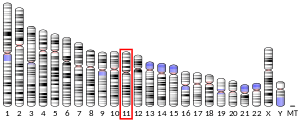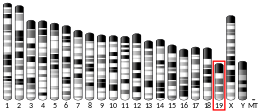Vascular endothelial growth factor B
Vascular endothelial growth factor B also known as VEGF-B is a protein that, in humans, is encoded by the VEGF-B gene.[5] VEGF-B is a growth factor that belongs to the vascular endothelial growth factor family, of which VEGF-A is the best-known member.
Function
In contrast to VEGF-A, VEGF-B plays a less pronounced role in the vascular system: Whereas VEGF-A is important for the formation of blood vessels, such as during development or in pathological conditions, VEGF-B seems to play a role only in the maintenance of newly formed blood vessels during pathological conditions.[6] VEGF-B plays also an important role on several types of neurons. It is important for the protection of neurons in the retina[7] and the cerebral cortex during stroke [8] and of motoneurons during motor neuron diseases such as amyotrophic lateral sclerosis.[9]
VEGF-B exerts its effects via the FLT1 receptor.[10]
VEGF-B has also been found to control endothelial uptake and transport of fatty acids in heart and skeletal muscle.[11][12]
References
- GRCh38: Ensembl release 89: ENSG00000173511 - Ensembl, May 2017
- GRCm38: Ensembl release 89: ENSMUSG00000024962 - Ensembl, May 2017
- "Human PubMed Reference:". National Center for Biotechnology Information, U.S. National Library of Medicine.
- "Mouse PubMed Reference:". National Center for Biotechnology Information, U.S. National Library of Medicine.
- "Entrez Gene: VEGFB vascular endothelial growth factor B".
- Zhang F, Tang Z, Hou X, Lennartsson J, Li Y, Koch AW, Scotney P, Lee C, Arjunan P, Dong L, Kumar A, Rissanen TT, Wang B, Nagai N, Fons P, Fariss R, Zhang Y, Wawrousek E, Tansey G, Raber J, Fong GH, Ding H, Greenberg DA, Becker KG, Herbert JM, Nash A, Yla-Herttuala S, Cao Y, Watts RJ, Li X (April 2009). "VEGF-B is dispensable for blood vessel growth but critical for their survival, and VEGF-B targeting inhibits pathological angiogenesis". Proc. Natl. Acad. Sci. U.S.A. 106 (15): 6152–7. doi:10.1073/pnas.0813061106. PMC 2669337. PMID 19369214.
- Li Y, Zhang F, Nagai N, Tang Z, Zhang S, Scotney P, Lennartsson J, Zhu C, Qu Y, Fang C, Hua J, Matsuo O, Fong GH, Ding H, Cao Y, Becker KG, Nash A, Heldin CH, Li X (March 2008). "VEGF-B inhibits apoptosis via VEGFR-1-mediated suppression of the expression of BH3-only protein genes in mice and rats". J. Clin. Invest. 118 (3): 913–23. doi:10.1172/JCI33673. PMC 2230661. PMID 18259607.
- Sun Y, Jin K, Childs JT, Xie L, Mao XO, Greenberg DA (October 2004). "Increased severity of cerebral ischemic injury in vascular endothelial growth factor-B-deficient mice". J. Cereb. Blood Flow Metab. 24 (10): 1146–52. doi:10.1097/01.wcb.0000134477.38980.38. PMID 15529014.
- Poesen K, Lambrechts D, Van Damme P, Dhondt J, Bender F, Frank N, Bogaert E, Claes B, Heylen L, Verheyen A, Raes K, Tjwa M, Eriksson U, Shibuya M, Nuydens R, Van Den Bosch L, Meert T, D'Hooge R, Sendtner M, Robberecht W, Carmeliet P (October 2008). "Novel role for vascular endothelial growth factor (VEGF) receptor-1 and its ligand VEGF-B in motor neuron degeneration". J. Neurosci. 28 (42): 10451–9. doi:10.1523/JNEUROSCI.1092-08.2008. PMID 18923022.
- Yamazaki Y, Morita T (November 2006). "Molecular and functional diversity of vascular endothelial growth factors". Mol. Divers. 10 (4): 515–27. doi:10.1007/s11030-006-9027-3. PMID 16972015.
- Muoio DM (July 2010). "Metabolism and vascular fatty acid transport". N. Engl. J. Med. 363 (3): 291–3. doi:10.1056/NEJMcibr1005397. PMID 20647206.
- Hagberg CE, Mehlem A, Falkevall A, Muhl L, Fam BC, Ortsäter H, Scotney P, Nyqvist D, Samén E, Lu L, Stone-Elander S, Proietto J, Andrikopoulos S, Sjöholm A, Nash A, Eriksson U (October 2012). "Targeting VEGF-B as a novel treatment for insulin resistance and type 2 diabetes". Nature. 490 (7420): 426–30. doi:10.1038/nature11464. PMID 23023133.
- Olofsson B, Korpelainen E, Pepper MS, Mandriota SJ, Aase K, Kumar V, Gunji Y, Jeltsch MM, Shibuya M, Alitalo K, Eriksson U (September 1998). "Vascular endothelial growth factor B (VEGF-B) binds to VEGF receptor-1 and regulates plasminogen activator activity in endothelial cells". Proc. Natl. Acad. Sci. U.S.A. 95 (20): 11709–14. doi:10.1073/pnas.95.20.11709. PMC 21705. PMID 9751730.
- Makinen T, Olofsson B, Karpanen T, Hellman U, Soker S, Klagsbrun M, Eriksson U, Alitalo K (July 1999). "Differential binding of vascular endothelial growth factor B splice and proteolytic isoforms to neuropilin-1". J. Biol. Chem. 274 (30): 21217–22. doi:10.1074/jbc.274.30.21217. PMID 10409677.
Further reading
- Poesen K, Lambrechts D, et al. (2008). "Novel Role for Vascular Endothelial Growth Factor (VEGF)Receptor-1 and Its Ligand VEGF-B in Motor Neuron Degeneration". J. Neurosci. 28 (42): 10451–9. doi:10.1523/JNEUROSCI.1092-08.2008. PMID 18923022.
- Joukov V, Kaipainen A, Jeltsch M, et al. (1997). "Vascular endothelial growth factors VEGF-B and VEGF-C". J. Cell. Physiol. 173 (2): 211–5. doi:10.1002/(SICI)1097-4652(199711)173:2<211::AID-JCP23>3.0.CO;2-H. PMID 9365524.
- Olofsson B, Pajusola K, Kaipainen A, et al. (1996). "Vascular endothelial growth factor B, a novel growth factor for endothelial cells". Proc. Natl. Acad. Sci. U.S.A. 93 (6): 2576–81. doi:10.1073/pnas.93.6.2576. PMC 39839. PMID 8637916.
- Olofsson B, Pajusola K, von Euler G, et al. (1996). "Genomic organization of the mouse and human genes for vascular endothelial growth factor B (VEGF-B) and characterization of a second splice isoform". J. Biol. Chem. 271 (32): 19310–7. doi:10.1074/jbc.271.32.19310. PMID 8702615.
- Grimmond S, Lagercrantz J, Drinkwater C, et al. (1996). "Cloning and characterization of a novel human gene related to vascular endothelial growth factor". Genome Res. 6 (2): 124–31. doi:10.1101/gr.6.2.124. PMID 8919691.
- Olofsson B, Korpelainen E, Pepper MS, et al. (1998). "Vascular endothelial growth factor B (VEGF-B) binds to VEGF receptor-1 and regulates plasminogen activator activity in endothelial cells". Proc. Natl. Acad. Sci. U.S.A. 95 (20): 11709–14. doi:10.1073/pnas.95.20.11709. PMC 21705. PMID 9751730.
- Makinen T, Olofsson B, Karpanen T, et al. (1999). "Differential binding of vascular endothelial growth factor B splice and proteolytic isoforms to neuropilin-1". J. Biol. Chem. 274 (30): 21217–22. doi:10.1074/jbc.274.30.21217. PMID 10409677.
- Ikuta T, Ariga H, Matsumoto K (2001). "Extracellular matrix tenascin-X in combination with vascular endothelial growth factor B enhances endothelial cell proliferation". Genes Cells. 5 (11): 913–927. doi:10.1046/j.1365-2443.2000.00376.x. PMID 11122379.
- Strausberg RL, Feingold EA, Grouse LH, et al. (2003). "Generation and initial analysis of more than 15,000 full-length human and mouse cDNA sequences". Proc. Natl. Acad. Sci. U.S.A. 99 (26): 16899–903. doi:10.1073/pnas.242603899. PMC 139241. PMID 12477932.
- Qi JH, Ebrahem Q, Moore N, et al. (2003). "A novel function for tissue inhibitor of metalloproteinases-3 (TIMP3): inhibition of angiogenesis by blockage of VEGF binding to VEGF receptor-2". Nat. Med. 9 (4): 407–15. doi:10.1038/nm846. PMID 12652295.
- Trompezinski S, Berthier-Vergnes O, Denis A, et al. (2004). "Comparative expression of vascular endothelial growth factor family members, VEGF-B, -C and -D, by normal human keratinocytes and fibroblasts". Exp. Dermatol. 13 (2): 98–105. doi:10.1111/j.0906-6705.2004.00137.x. PMID 15009103.
- Gerhard DS, Wagner L, Feingold EA, et al. (2004). "The status, quality, and expansion of the NIH full-length cDNA project: the Mammalian Gene Collection (MGC)". Genome Res. 14 (10B): 2121–7. doi:10.1101/gr.2596504. PMC 528928. PMID 15489334.
- Timoshenko AV, Chakraborty C, Wagner GF, Lala PK (2006). "COX-2-mediated stimulation of the lymphangiogenic factor VEGF-C in human breast cancer". Br. J. Cancer. 94 (8): 1154–63. doi:10.1038/sj.bjc.6603067. PMC 2361247. PMID 16570043.
- Iyer S, Scotney PD, Nash AD, Ravi Acharya K (2006). "Crystal structure of human vascular endothelial growth factor-B: identification of amino acids important for receptor binding". J. Mol. Biol. 359 (1): 76–85. doi:10.1016/j.jmb.2006.03.002. PMID 16616187.
- Yamada E, Yamazaki K, Takano K, et al. (2007). "Iodide inhibits vascular endothelial growth factor-A expression in cultured human thyroid follicles: a microarray search for effects of thyrotropin and iodide on angiogenesis factors". Thyroid. 16 (6): 545–54. doi:10.1089/thy.2006.16.545. PMID 16839256.
- de Paulis A, Prevete N, Fiorentino I, et al. (2007). "Expression and functions of the vascular endothelial growth factors and their receptors in human basophils". J. Immunol. 177 (10): 7322–31. doi:10.4049/jimmunol.177.10.7322. PMID 17082651.
External links
- PDBe-KB provides an overview of all the structure information available in the PDB for Human Vascular endothelial growth factor B






